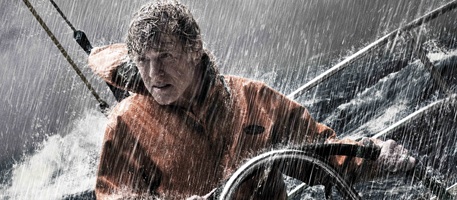Filmmaking is a rigorous and detail-oriented process, the act of assembling tiny shots and sound effects and CGI and trusting that each step will get you where you're going. Survival is a process too, assessing a problem and solving it, finding the right tools at the right time, finding confidence in yourself or at least the guts to fake it. All Is Lost is a very well-crafted film that adopts the methodical rigor of its hero, taking us step by step through the aftermath of a disaster, with a silent protagonist who embraces that hoary but true movie maxim: show, don't tell.
It's a surprisingly experimental take on the survivalist story, especially coming so soon as the more conventionally thrilling Captain Phillips and Gravity and even after director J.C. Chandor's own Margin Call, a star-stuffed financial drama with big-studio gloss. Deceptively complex, All Is Lost sets out as a dead-simple story about a nameless yachtsman (Robert Redford) surviving both a hole in his boast and a series of devastating storms. The sailor patches holes and rigs up the emergency jib, takes a minute to shave before the storm begins and calmly extricates himself from a terrifyingly roiling sea. He is stoic and smart and almost never speaks; his first words, save a brief voiceover, come more than an hour into the film in the form of an elongated "Fuck!" But he is Redford and a star, and we happily watch him-- and that way we get to watch the real show of what Chandor is doing all around him.
Though not as expansive as, say, a skyscraper or a luxury ocean liner, the yacht at the center of All Is Lost is filmed in the way all settings for locked-in thrillers must be: precisely. Chandor establishes the key spaces of the boat-- the bed, the tiny kitchen, the enormous mast-- and then revels in turning them over, helping us understand the devastation the sailor faces with a single shot of a sail billowing underwater. The sailor knows more than we do, pulling items out of cabinets labeled "Potable Water" or "Life Raft," but Chandor expertly manages that tug-of-war between our involvement in his survival and our ability to marvel at his skill. A wealthy man with fine sweaters and middle-aged-dude sneakers, the sailor is an obvious product of the modern era-- a laptop and GPS are ruined early in the film-- but consistently clever and brave, cooking up Boy Scout survival skills and lashing himself to the rail in whipping winds with the hard-eyed confidence that he can win this thing.
Late in the film the sailor fishes out a box that contains an old-fashioned navigation tool like something Christopher Columbus might have used; it's obviously a novelty item, a gift, and something he probably brought onboard as a favor to whichever relative gave it to him. But cut off from nearly every modern convenience the sailor knows how to use it, suddenly connected to the adventurers who first crossed the ocean and allowed such amazing things as rich men who could sail around the world for fun. All Is Lost doesn't lean heavily on any of its themes-- it is above all a tense and methodical thriller-- but the silence gives you time to think about these things. Marvel at how Robert Redford's face has aged, and how easily he conveys both comfortable living and gritty determination. Marvel at the film's tensest scenes, how Chandor cuts and swoops the camera to disorient and thrill and terrify. Marvel at the strength of the human spirit, the incredible way boats are constructed, the schools of fish swimming just beneath the surface of the sea-- there's time for all of it, and All Is Lost's meditative space combines beautifully with its basic thriller structure.
It becomes a bit too much at times-- how many storms can we watch this man endure? How heavy does Chandor really need to go on the emotions of the climax? And Redford, though charismatic and in fine form after several years away from actor, is not exactly a revelation-- we all know he could hold the screen even with minimal dialogue. But All Is Lost is primarily a major coming-out for Chandor, not only in his skill in managing the film's tension, but in his commitment to this unconventional and bold structure. Even if it were just a filmmaking exercise All Is Lost would be impressive, but the weight of Redford's performance provides depth and a touch of sentiment; it's nothing new to watch an impressive survival story onscreen, but rare to see it done this well.
Your Daily Blend of Entertainment News
Staff Writer at CinemaBlend


